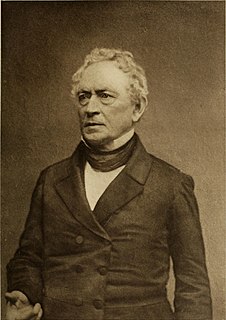A Quote by Robert Southey
Faith in the hereafter is as necessary for the intellectual as the moral character; and to the man of letters, as well as to the Christian, the present forms but the slightest portion of his existence.
Related Quotes
Man's chief difference from the brutes lies in the exuberant excess of his subjective propensities his preeminence over them simply and solely in the number and in the fantastic and unnecessary character of his wants, physical, moral, aesthetic, and intellectual. Had his whole life not been a quest for the superfluous, he would never have established himself as inexpugnably as he has done in the necessary.
By helping to raise man above the level of bestial vegetation, faith contributes in reality to the securing and safeguarding of his existence. Take away from present-day mankind its education-based, religious-dogmatic principles- or, practically speaking, ethical-moral principles- by abolishing this religious education, but without replacing it by an equivalent, and the result will be a grave shock to the foundations of their existence.
When a man sought knowledge, it would not be long before it could be seen in his humbleness, his sight, upon his tongue and his hands, in his prayer, in his speech and in his disinterest (zuhd) in worldly allurements. And a man would acquire a portion of knowledge and put it into practice, and it would be better for him than the world and all it contains - if he owned it he would give it in exchange for the hereafter.
In Buddhism, both learning and practice are extremely important, and they must go hand in hand. Without knowledge, just to rely on faith, faith, and more faith is good but not sufficient. So the intellectual part must definitely be present. At the same time, strictly intellectual development without faith and practice, is also of no use. It is necessary to combine knowledge born from study with sincere practice in our daily lives. These two must go together.
The beauty of man's being, fashioned as he is in the fairest of forms, demonstrates the existence of the Maker, while at the same time the fact that, together with his comprehensive abilities, lodged in that fairest of forms, he soon declines and dies, demonstrates the existence of the resurrection.
Our churches are filled with Christians who are idling in intellectual neutral. As Christians, their minds are going to waste. One result of this is an immature, superficial faith. People who simply ride the roller coaster of emotional experience are cheating themselves out of a deeper and richer Christian faith by neglecting the intellectual side of that faith.
In order to increase his pleasures, man has intentionally added to the number and pressure of his needs, which in their original state were not much more difficult to satisfy than those of the brute. Hence luxury in all its forms; delicate food, the use of tobacco and opium, spirituous liquors, fine clothes, and the thousand and one things that he considers necessary to his existence.
The main problem with those who deny the existence of God is not intellectual. It is not because of insufficient information, or that God's manifestation of himself in nature has been obscured. The atheists' problem is not that they cannot know God, rather it is they do not want to know him. Man's problem with the existence of God is not an intellectual problem; it is a moral problem." For the wrath of God is revealed from heaven against all ungodliness and unrighteousness of men - Rom. 1:18"
Words of divine consciousness: moral exaltation; lasting feelings of elevation, elation, joy; a quickening of the moral sense, which strikes one as more important than an intellectual understanding of things; an alignment of the universe along moral lines, not intellectual ones; a realization that the founding principle of existence is what we call love, which works itself out sometimes not clearly, not cleanly, not immediately, nonetheless ineluctably.
Men have gone on to build up vast intellectual schemes, philosophies, and theologies, to prove that ideals are not real as ideals but as antecedently existing actualities. They have failed to see that in converting moral realities into matters of intellectual assent they have evinced lack of moral faith.
It is not his business to argue men into faith, for that cannot be done; but it is his business to demonstrate the intellectual adequacy of the biblical faith and the comparative inadequacy of its rivals, and to show the invalidity of the criticisms that are brought against it. This he seeks to do, not from any motive of intellectual self-justification, but for the glory of God and His gospel.







































